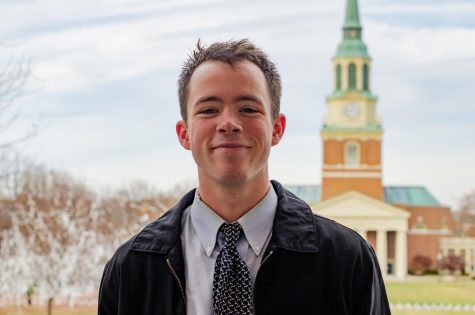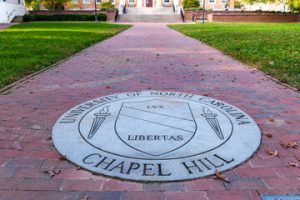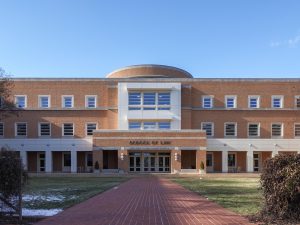Wake Forest discloses use of social media monitoring service to detect campus threats
The AI software has attracted controversy after an investigation revealed universities used the service to track student protests
Social Sentinel’s AI tracks social media posts to determine threats to campus safety.
October 6, 2022
Wake Forest confirmed this week that it has been tracking public social media posts to monitor campus safety since 2017.
According to an investigation from the Dallas Morning News, Wake Forest is one of 37 colleges to have used the social media monitoring service known as Social Sentinel.
Social Sentinel, listed as a “threat-detection” service, uses AI technology to monitor student speech on social media in order to flag language that might indicate harm to individuals or institutions.
“The social media services have been used to alert the university to public social media posts that may indicate potential threats to campus safety,” wrote Cheryl Walker, executive director of university communications. “Using social media alert services to access publicly available information in today’s environment is a common practice at many higher education institutions to help increase campus safety.”
According to Walker, the services do not access private information, and Wake Forest has never used the services to monitor email or other Google applications.
Wake Forest also stated that they ended their contract with Social Sentinel in 2020 in order to switch to a different company that offers similar services.
What is Social Sentinel?
Social Sentinel did not return phone calls from the Old Gold & Black left on its press line. However, in an interview with WRAL in 2019, founder and CEO of Social Sentinel Gary Margolis compared the service to a “smoke detector.”
“We scan public digital content. We don’t surveil, we don’t monitor, we don’t follow,” Margolis said. “We’re not targeting individuals or groups. We don’t target anyone. We’re just looking at content.”
According to the company, the software’s purpose is to “maintain the safety of faculty, staff, students, as well as other bystanders and members of the community.”
One of Social Sentinel’s features, named Local+ List, utilizes geofencing technology, which locates cell phones in specific geographic areas and social media posts and other data within designated locations.
According to Ari Sen, the lead reporter on the investigation for Dallas Morning News, the feature can be used to target individual social media authors and has software that can scan public posts for specific languages and phrases to give localized alerts.
The feature can be used to create “targeted, complex search structures to apply to both inside and outside a geofence,” according to a contract between Social Sentinel and the University of North Carolina at Chapel Hill. A geofence is a virtual perimeter around a physical, geographic area that allows software to trigger an alert when a mobile device enters or leaves a physical area. This technology would work in areas of assembly and protest, to monitor the progress of a demonstration and social media activity within the area. UNC Chapel Hill used the Local+ List and geofencing services of Social Sentinel to monitor the protests surrounding the Silent Sam statue in 2019 and pro-choice demonstrations at the university in 2015, according to reporting from the Daily Tar Heel.
Though Social Sentinel has stated that the company is not designed to monitor student demonstrations, the Dallas Morning News reported that Social Sentinel has been promoted and used as a tool to “mitigate” and “forestall” protests.
Wake Forest stated that they did not use the Local+ List feature offered by Social Sentinel.
In an explainer provided by the company to justify monitoring of campus activism, Social Sentinel described how it can provide “important insight about crowd size and climate, resulting in possible strategy adjustments including the deployment of officers.”
The Old Gold & Black reached out to Wake Forest for a comment regarding the use of social media monitoring services during the Aug. 28, 2021 protest regarding the readmission of a former student onto campus and did not receive a response at time of publication.
A Complicated History
Navigate360, a school-safety solutions company, now has unprecedented popularity across the country. Navigate360 CEO J.P. Guilbault is quoted as saying their services, which now include Social Sentinel, are used by one in four K-12 schools in the country.
The Dallas Morning News investigation also revealed that Social Sentinel has been adopted by at least 52 school districts in Texas as an additional security measure since 2015, including Uvalde CISD, where a gunman killed 19 children and two teachers in May.
However, Social Sentinel has now attracted a complicated reputation.
Social Sentinel’s Local+ List feature bears a resemblance to Geofeedia, a monitoring service that was included in a 2016 ACLU investigation. After the ACLU revealed that the service targeted activists of color during Black Lives Matter protests with geolocation technology similar to Local+ List, Twitter, Meta and Instagram restricted these companies from the use of their data for surveillance.
UNC Chapel Hill, one of seven North Carolina schools to use or consider using Social Sentinel, announced in October 2022 that it plans to end its contract with the company, according to the Daily Tar Heel. The university also was reported to have used Geofeedia in 2015, according to public records.
In a conversation with the Old Gold & Black, Sen, a graduate of UNC Chapel Hill, detailed the need for legislative oversight, as well as the opposition that Social Sentinel faces within schools.
“Graig Meyer, the state representative for Orange County in the general assembly, is launching a legislative inquiry into the use of Social Sentinel in North Carolina colleges,” Sen said. “There has been pushback among students, faculty, and at the legislative level as well.”
åAs of now, federal privacy law does not outline a clear limit on the collection and storage of social media data for private companies like Navigate360.
Many other universities around the country have ended their contracts with the service due to its price and ineffectiveness, according to public records obtained by the Dallas Morning News.
Like Wake Forest, several other North Carolina schools have discontinued the use of Social Sentinel. North Carolina State University’s contract with the company ended in 2018, while UNC Charlotte chose not to pursue a contract due to a lack of funds, according to the Dallas Morning News.















